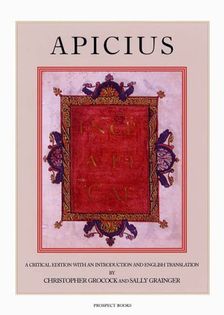Advertisement

De re coquinaria
by
from the publisher
Apicius is the sole remaining cookery book from the days of the Roman Empire. Though there were many ancient Greek and Latin works concerning food, this collection of recipes is unique. The editors suggest that it is a survival from many such collections maintained by working cooks and that the attribution to Apicius the man (a real-life Roman noble of the 2nd century AD), is a mere literary convention. There have been many English translations of this work (and, abroad, some important academic editions) but none reliable since 1958 (Flower and Rosenbaum). In any case, this edition and translation has revisited all surviving manuscripts in Europe and the USA and proposes many new readings and interpretations. The great quality of this editorial team is while the Latin scholarship is supplied by Chris Grocock, Sally Grainger contributes a lifetime's experience in the practical cookery of adaptations of the recipes in this text. This supplies a wholly new angle from which to verify the textual and editorial suggestions.
Why aren’t the recipes for this book available on ckbk?
This book has been licensed, and will soon be available on ckbk. New books are converted and uploaded each month.
Books which are part of ckbk's collection show one of these two logos:
 now available on ckbk
now available on ckbk coming soon to ckbk
coming soon to ckbk
- Original Publisher
- Prospect Books
- Date of publication
- 150
- ISBN
- 1903018137
Recommended by
William Woys Weaver
Food historian, author, gardener, epicure
I cite here the edited Latin edition by Mary Ella Milham mostly because it is the original text thus avoiding the controversies of other edited or translated editions. While the cookery book attributed to Apicius is in fact a compilation of several hands from several periods with no one particular author responsible for the total work, this is the most important cookbook surviving from Antiquity and thus it remains a source of study for insights into the cuisine of the ancient Greeks and Romans. It had a profound influence on the Renaissance and remains one of the great culinary classics of world culture.
Eleanor Barnett
Food historian
A collection of Roman recipes compiled in the 1st century AD, a gold mine for thinking about food in Antiquity. Flamingo and dormice feature in some of the more captivating recipes!
Jonathon Sawyer
Chef/Owner The Greenhouse Tavern, Noodlecat, Trentina, Tavern Vinegar Co. Cleveland, OH
The love child of cuisine citta eterna, originally published in 10 volumes including amazing recipes for garam, liver and even flamingo
Hervé This
Director of the AgroParisTech-INRA International Centre for Molecular Gastronomy
Ben Reade
Co-Owner/Chef at Edinburgh Food Studio
Ken Albala
Food historian
Sally Grainger
Food historian
Advertisement








